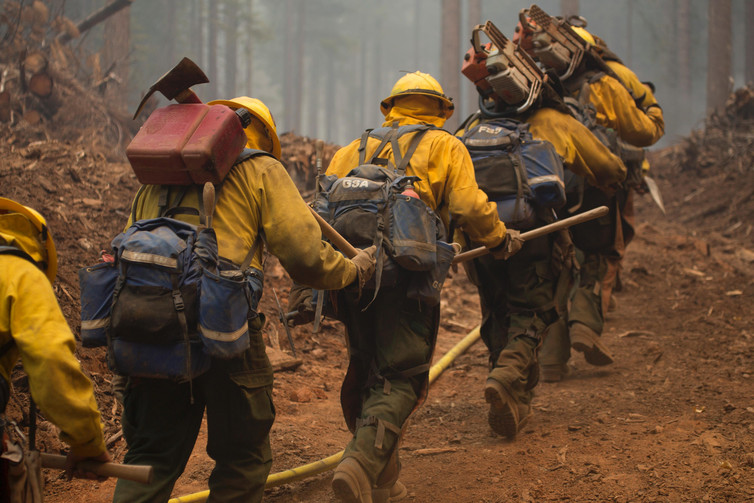
The vacation cabins that ring Seeley Lake emptied long before Labor Day this year. The tourists who come to swim, fish, and boat on the lake where Norman Maclean spent his summers had taken their fun and their recreation dollars elsewhere. Even many of the town’s full-time residents cleared out — as the Missoula City-County Health Department urgently recommended.
It happened because Seeley Lake, where the growing tourist trade has superseded Pyramid Mountain Lumber Co. as the primary driver of the economy, had turned into a hellscape. Smoke from the nearby Rice Ridge fire rolled down the surrounding hillsides with each night’s cooling air and filled the valley with so many pollutants that the county’s air-quality monitor was often pushed beyond its limits. Visibility shrank to less than a quarter mile, and streetlights along the main drag came on during cloudless days.
We live surrounded by fire-dependent forests, and fire itself is not a catastrophe. But there’s no doubt the fire season is lasting longer because of human-caused climate change, and our health is threatened. With each climate-enhanced threat, there is no shortage of climate advocates like myself to heckle everyone about emission reductions and the need to move to a clean energy economy.
I don’t intend to give up on clean energy (or on hectoring), but there’s another, more immediate, need. This is where we live now; among these ever-increasing “natural” disasters. Like Californians with earthquake survival kits stashed by the front door, we all need to become preppers.
At Climate Smart Missoula, the organization I run, we started a program called Summer Smart in 2016 to prepare our community for the changing conditions brought on by extreme heat, wildfires, and their negative health effects. We did the research, built the website, created health guides and videos, and connected with partners who work with vulnerable populations. We focused particularly on health risks from the fine particulate matter in wildfire smoke. That first summer was mild and smoke-free, gifting us another year to prepare.
2017 started with an above-average snowpack and a wet spring. Nonetheless, we rolled out a program that provided portable HEPA air filters to individuals, creating healthy indoor air when it’s smoky outside. Specifically, we gave filters to low-income, home-bound seniors with health issues who were referred to us through Missoula Aging Services and their Meals on Wheels program.
We thought we might coast. But by August, we were in a “flash drought”— an abrupt stop to the rain and two months of scorching temperatures. Previously moist forests turned tinder dry, and lightning-sparked fires popped up everywhere. Nearby fires filled Seeley Lake and Lolo with smoke on a daily basis, while fires in Washington, Oregon, Idaho, and British Columbia took turns lofting smoke high above us. Whenever the inversions broke and the local smoke lifted, out-of-state pollution mixed down to take its place. The need for HEPA filters took off like a wildfire on a windy night. Suddenly we were playing catch-up.
Missoula City-County air quality specialist Sarah Coefield — who was fast becoming famous for her twice-daily darkly humorous updates on smoke conditions — got desperate calls to help babies, health-care workers in Seeley Lake, and when the fire season stretched into September, entire schools. Sarah called me, and we joined forces, expanding our program to help whoever was most vulnerable.
We scoured our budgets for emergency funds, begged and borrowed, pleaded for discounts with sales reps and drained our bank account, ordering dozens and dozens of filters. At one point I had over $4,000 worth of air filters on my personal credit card. Other nonprofits and private citizens joined the effort and safe indoor air spaces began to proliferate even as the smoke got thicker.
There are two interrelated reasons our scrappy little nonprofit ended up on the front lines of local disaster management. First, we had an established program that was able to spin up quickly when the need became great. But more importantly, and the reason we had that program in the first place, is that we saw the problem for what it really is: not just smoke, not just wildfires, and not just heat waves.
Climate change is a bigger problem than any of these individual effects, and if we merely react to each calamity in turn, we’ll be caught off-guard again and again. Climate change is already affecting our rivers, our wildlife, our health and our economy. It will only get worse. It’s time to get ready. We need everybody.
Amy Cilimburg is executive director of Climate Smart Missoula.
[…] AMY CILIMBURG – TREESOURCE · Image by ANDREW ORLEMAN / […]